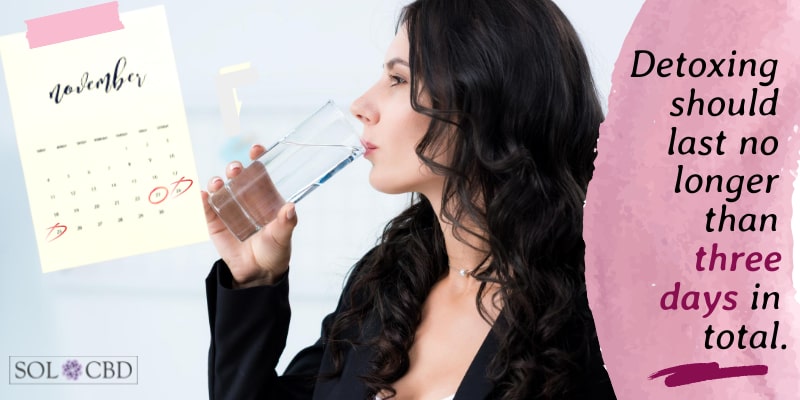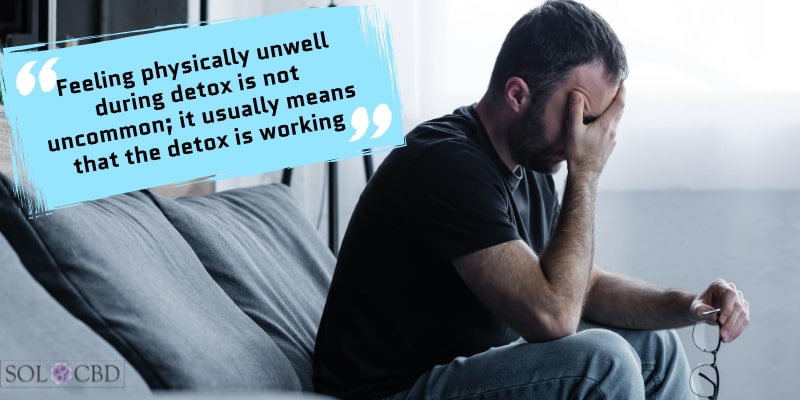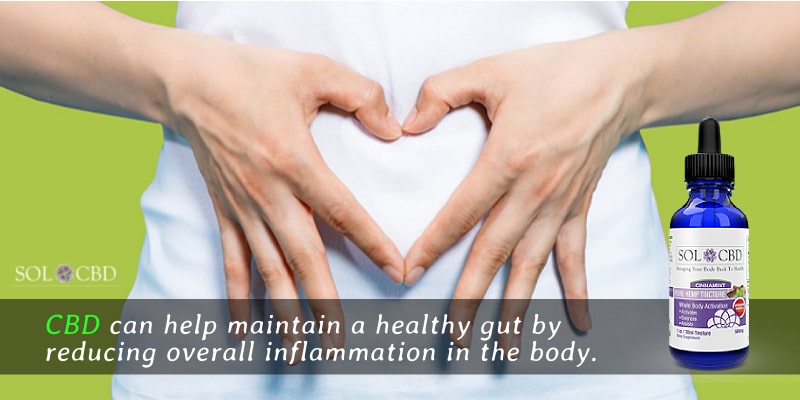Detoxing and cleansing are more popular than ever. Detox plans are very common, and they focus on placing restrictions on your diet with the addition of supplements, fasting, and exercise. These popular diets claim to cleanse your blood and body of harmful toxins that have built up and ward off intruders.
So why would someone need to detox? Who should detox? How often can you detox? Could cannabidiol (CBD) aid in the detox process, and how? We will cover all of this information and more as we take a look at the best ways to cleanse your body.
Table of Contents
1. What Is Detox?
1.1 How to Detox: Different Methods of Detoxing
1.2 How Often Can You Detox?
1.3 Signs Your Body Needs Detoxing
1.4 Common Detox Symptoms
2. Benefits of CBD for Detoxing
2.1 Hormones
2.2 Restoring Gut Health
2.3 Improving GI, Kidney, and Liver Function
2.4 Reducing Pain & Anxiety
2.5 Fighting Insomnia
2.6 Supporting the Immune System
3. Final Thoughts on CBD Oil as a Natural Detox Aid
LISTEN TO THE BLOG POST HERE:
1. What Is Detox?
Detoxing sounds like a good idea, and it may be for some people who are generally healthy. However, if you have any serious medical conditions or health issues, you should always speak to your doctor before you begin any type of detoxification process.
Removing toxins from the body can result in a few potential effects, which may include:
- Weight loss
- Constipation relief
- Improved energy levels
- Fewer headaches
- Relief from muscle aches
- Reduced fatigue and lethargy

While the body is capable of detoxifying itself naturally through biotransformation, individuals often use detox diets to optimize their health, encourage weight loss, and eliminate toxins from the body regularly. Detox programs typically include:
- Fasting
- Juicing
- Supplementation
- Vegan diets
- Liquid diets
- Other methods created purposefully to detox the body
Some people even go the extra mile and do interesting diet culture fads like the coffee enema, in which a person flushes out their rectum with diluted coffee. This can be potentially dangerous, as cleansing of the colon promotes the risk of dehydration, impaired bowel function, electrolyte imbalance, and intestinal flora disruption.
You can find a large variety of different detox methods, which we will get into soon here. Despite coffee enemas being a somewhat dangerous detox method, there are plenty that are safe and beneficial for your body and general well-being—especially ones that don’t require the individual to follow the plan for longer than a couple of days or force you to restrict calories to an extreme.

Detox diets are normally short in length and are designed to eliminate any toxins hanging out in your body. These diets supposedly help in the following areas: [1]
- Fasting help rest your organs, as they aren’t working to digest or eliminate anything heavy
- Detoxing stimulates the liver, aiding in eliminating toxins
- Eliminates toxins through sweat, feces, and urine
- Improves circulation
- Provides the body with tons of nutrients
- Obesity
- Digestive health problems
- Autoimmune diseases
- Allergies
- Bloating
- Chronic fatigue
- Inflammation (CBD can also help with this)
While personal experiences suggest that detoxes can be beneficial for your overall health, making you feel rejuvenated and more energized, human research conducted in regard to detox diets is lacking. We don’t have a lot of information on the exact effects and benefits that detoxing has on the body. So while detoxing, you should never take it to the extreme—a little research can help you find the best body cleanse for you.

Now:
Since we know what detoxing means and what a detox essentially is, let’s get into the different methods of detox diets and how often you should be detoxing.
1.1 How to Detox: Different Methods of Detoxing
A typical detox diet will involve a period of fasting, followed by a vegan-based diet of fruit, vegetables, homemade fruit juices, and lots of water. Sometimes a detox also includes herbs, supplements, teas, colon cleanses, or enemas.
Detoxification plans and programs typically either involve a single process or various approaches. These approaches and methods may include:
- Fasting
- Juicing
- Eating only certain foods (usually vegan or whole foods)
- Eliminating sugar, gluten, and caffeine
- Minimizing snacking and eating slowly
- Using commercial products like dietary supplements or herbs advertised for detoxing
- Colonic irrigation
- Reducing the amount of overall environmental exposures
- Using a sauna to sweat out the toxins

These programs may be offered at health centers, as a part of naturopathic treatment, or as an at-home plan you can easily follow.
Juice Cleanse
Juice cleanses involve drinking only freshly squeezed juice from fruits and veggies, and you can do this at home or spend a fortune on pre-packed, more convenient juice cleanses online.
Liver Detox
Liver detoxes involve the ingestion of leafy, green vegetables, seeds, herbs, grains, and some sort of potassium supplement. This helps your organs flush out toxins via fecal matter and urine.

Colon Cleanse
Colon cleanses are designed to help support bowel movement, although that is not always the case. Colon cleanses should be done with extreme caution and only by individuals who know exactly what they are doing.
These cleanses involve flushing either plain filtered water or filtered water with the addition of herbs, vitamins, or enzymes, or even coffee into the large bowel through the rectum. This supposedly flushes out hardened stool. Sometimes colon cleanses can have adverse effects and cause constipation afterward.
There are some potential risks and side effects of doing a colon cleanse, including:
- Dehydration
- Vomiting
- Nausea (CBD can help with this)
- Cramps
- Dizziness
- Dehydration
- Mineral imbalance
- Electrolyte imbalance
- Bacterial imbalance
- Infection
- Bowel perforation
- Depletion of helpful normal bowel flora unless replaced with probiotics
- Kidney failure
Herbal Detox
Herbal detoxes are designed to help individuals to lose weight. This type of detox typically consists of natural herbs that gently stimulate your bowels, eliminating toxins and reducing blood sugar levels.
These herbal detoxes aim to help optimize the functions of the digestive system.

1.2 How Often Can You Detox?
If you plan on doing a body cleanse or detox, aim for somewhere between one and three days in total. This will be a sufficient amount of time to rid your body of the toxins you are trying to eliminate.
As for the frequency of the detox or cleanse, some would say you shouldn’t partake in a full-body cleanse more than five times per year. Others say you should detox once per week, and some even say you can detox as often as you want! So the answer to this question is all over the place, and you’ll just need to tune in to your specific needs to determine whether you need a weekly, monthly, bi-monthly, or yearly cleanse.
If you have digestive health issues and your stomach is constantly giving you issues or you’re always bloated or constipated, you may benefit from detoxing weekly for 1–2 days. It may help to get your gut back on track. If you’re generally healthy but you feel as though you’d benefit from detoxing now and then, try detoxing once a month or once every two months.

1.3 Signs Your Body Needs Detoxing
How can you know when your body is ready for a detox? Let’s discuss the signs that your body needs a detox.
- Persistent fatigue that does not go away after sleeping. Taking a nap every now and then is fine, but if you wake up after a full night of sleep and are still dragging throughout your day, you may need a detox to help you get back to feeling like yourself again.
- Infrequent bowel movements and constipation. This can be dangerous because those toxins are stuck in your body for longer than normal and can be reabsorbed instead of exiting. If you are constipated often, you may need to detox.
- Stubborn pounds that don’t ever seem to fall off. If you are eating clean and exercising but you still cannot lose that belly fat, it may be a sign you need to detox. Fat cells hold on to toxins, and the body is smart enough to realize that breaking down those fat cells means releasing toxins into the body. This makes the body very hesitant to do so.

- Skin problems or foul body odor. When our livers get loaded and the body isn’t eliminating toxins through normal means like regular bowel movements, it will find other means to carry out this process such as through the skin. The skin tries to eliminate harmful chemicals and substances by sweating, rashes, rosacea, and eczema. Skin conditions like these and a foul body odor suggest your body requires a detox.
- Issues with the gallbladder. Gallbladder problems can oftentimes be indicators of other systems being out of balance. This often-overlooked organ is the liver’s right-hand man, so to speak. So poor digestion, pain in the rib cage after eating or being physically active, and gallstones are all your body’s way of telling you that you need to cleanse yourself.
This is where things get more interesting:
Now that we know about the warning signs that your body may be displaying, let’s go over how you can tell whether you are detoxing.

1.4 Common Detox Symptoms
If you’ve never done a detox before, it can be difficult to determine when the actual detoxing begins. Further, some of the signs you’re detoxing may surprise you. As your body purifies itself and rids itself of harmful toxins, you may experience various symptoms. Some of these include:
- Lethargy
- Muscle aches
- Headaches
- Mucus or other forms of discharge
- Pasty tongue
- Weakness
- Difficulty sleeping
- Flu-like symptoms
- Irritability
- Diarrhea
- Constipation
- Frequent urination
- Rashes (CBD can help with this)
- Gas
- Cravings
- Nausea

When it comes to detoxing, it isn’t always a breeze. You typically do not feel “good” while you are detoxing; that comes afterward. These are cues that your body is doing its job and is eliminating the bad stuff.
Now, how about CBD? Where does that come into play?
Well, CBD may be able to help with the side effects of detoxing, as well as providing its benefits that go hand in hand with the detox process. (Click to Tweet)
RELATED: New to CBD? Learn What CBD Stands for and Potential Benefits
2. Benefits of CBD for Detoxing
Cannabidiol has been suggested to have effects on multiple organs and systems in your body, including:
- Improving gastrointestinal (GI), kidney, and liver function
- Distributing vitamins
- Restoring gut health
- Reducing pain and anxiety
- Reducing insomnia
- Supporting the immune system
CBD is not meant to treat any physical, emotional, or mental conditions, but instead promotes an overall sense of wellness. (Click to Tweet)
The following are a few different types of detoxes that can be done in conjunction with using CBD oil to promote a sense of wellness and support your detox plans.
RELATED: The 7 CBD Oil Uses and Benefits That Are Most Popular
2.1 Hormones
Hormones are necessary in normal amounts, but sometimes hormones can get a bit out of control. Some symptoms associated with hormonal changes include:
- Weight gain
- Mood swings
- Soreness
- Headaches
- Eczema
- Hot flashes
- Night sweats
When you experience the symptoms listed above, it doesn’t necessarily mean that your hormones are functioning improperly, but it may be an indicator that your body is having issues detoxing your hormones properly.
RELATED: This Is Why Women Love CBD Products
CBD oil may be able to help you handle your side effects more efficiently, as it is known for being mildly pain-relieving and stress- and anxiety-reducing. Cannabidiol is also great for skin conditions like eczema. [2]
If you find yourself sweating out of anxiety, CBD may be able to fight off the anxiety and by doing so will also solve the issue of sweating. It also may be able to help with night sweats and possibly for the symptoms associated with hot flashes as well. [3]
Earlier, we mentioned the side effects of detoxing. Muscle aches, difficulty sleeping, irritability, constipation, nausea, and rashes are all things that can be easily managed by the use of CBD as well.
RELATED: CBD Balm for Your Sore Muscles?
2.2 Restoring Gut Health
CBD interacts with the endocannabinoid system (ECS) by positively impacting CB1 and CB2 receptors found throughout the body. Cannabidiol can support immune and nervous system functioning. CBD can do quite a bit via the ECS, so it makes sense to believe that it can also help maintain a healthy GI system by reducing overall inflammation in the body.
Disorders like inflammatory bowel disease (IBS), ulcerative colitis, and Crohn’s disease are all associated with negative symptoms that can be managed by CBD. Diarrhea, constipation, gas, heartburn, and nausea are all digestive issues that individuals have found improved by using cannabidiol.
2.3 Improving GI, Kidney, and Liver Function
Cannabidiol has shown promise when it comes to its anti-inflammatory, hepatoprotective, and antioxidant properties. CBD may be able to manage chronic liver diseases involving fatty degeneration or inflammatory changes effectively. (Click to Tweet)
CBD also possesses the potential to reduce pain associated with liver and kidney disease. While studies surrounding CBD and kidney issues are limited, cannabidiol may be able to protect the kidneys from damage or slow the progression of kidney disease. [4]
Cannabidiol has also been suggested to modulate systemic and acute inflammation in the body. It does so by halting the production of cytokines and interleukins. This results in benefits for individuals with colitis, gas, bloating, IBS, and damage to the gut lining. (Click to Tweet)

Another reason CBD has been thought to improve GI function is that it can lower cortisol levels, which in turn prevents intestinal permeability or “leaky gut.” The fact that CBD can effectively manage cortisol levels is an indicator that it supports our digestive health. [5]
2.4 Reducing Pain and Anxiety
There are both animal and human studies that have indicated that CBD possesses some degree of anxiolytic properties. Cannabidiol may be able to reduce muscle tension and joint pain, certain issues commonly associated with arthritis, anxiety, and depression. [6][7]
Cannabidiol works to reduce pain by acting on various biological processes within the body. It’s also helpful for managing the anxiety that people living with chronic pain often struggle with.
RELATED: CBD Oil for Anxiety—Dosage Guidelines
2.5 Fighting Insomnia
One investigation found that compared with a placebo, a CBD dosage of 160 mg increased sleep duration. This suggests that CBD may be an efficient sleep aid, able to help you sleep longer and feel more rested when you wake. [8]
Cortisol levels normally peak in the morning; however, individuals who struggle with insomnia typically have higher cortisol levels at night. Higher cortisol levels at night usually result in more nighttime awakenings. [9][10]
RELATED: Using CBD for Insomnia: What You Need to Know
2.6 Supporting the Immune System
Studies have revealed that cannabidiol possesses anti-inflammatory qualities and acts as an immunomodulatory and immunosuppressant. CBD supports the immune system by suppressing the functions of your immune system and keeping it active while it is underperforming. [11]
Immunosuppressants can control autoimmune diseases such as psoriasis, rheumatoid arthritis, and Crohn’s disease. There are even some treatments for cancer that act as immunosuppressants. That being said, CBD may be beneficial to those with autoimmune disorders.
RELATED: How to Strengthen Your Immune System
3. Final Thoughts on CBD Oil as a Natural Detox Aid
While there are many methods of and reasons for detoxing, using a natural CBD oil supplement can support each of them with its numerous benefits. Regardless of your motivation and method for detoxing, it’s worth including CBD into your routine to boost your immune system, reduce anxiety and stress, and help you sleep better (among other things).
Sources:
- https://pubmed.ncbi.nlm.nih.gov/22103982/
- https://www.ncbi.nlm.nih.gov/pmc/articles/PMC7736837/
- https://link.springer.com/article/10.1007/s13311-015-0387-1?handl_url=https:/successtms.com/blog/new-treatments-for-depression&error=cookies_not_supported&code=d8367e25-f099-4944-9cf4-dfa15390875f#Sec18
- https://jpet.aspetjournals.org/content/jpet/early/2008/12/12/jpet.108.147181.full.pdf
- https://europepmc.org/article/med/8257923
- https://journals.sagepub.com/doi/abs/10.1177/0269881110379283
- https://journals.sagepub.com/doi/abs/10.1177/026988119300700112
- https://pubmed.ncbi.nlm.nih.gov/24281562/
- https://www.ncbi.nlm.nih.gov/books/NBK538239/
- https://www.ncbi.nlm.nih.gov/pmc/articles/PMC4688585/
- https://www.ncbi.nlm.nih.gov/pmc/articles/PMC7173676/



































